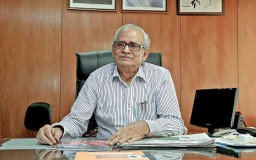
For a country where the RMG sector accounts for 20% of GDP and 75% of foreign exchange, one would expect a separate ministry to be looking at the interest of the industry, but Bangladesh is working on a model where a number of ministries look at different aspects of the industry, with the nodal ministry being the Ministry of Textile & Jute. “We are very proud of what the apparel manufacturing industry has done for the country, and there has been a constant demand for a separate ministry for the same, but to say that the support to the industry would be better and more proactive is wrong,” says Md. Emaz Uddin Pramanik, Minister of Textiles & Jute. In a freewheeling interview with Team AO in Dhaka recently, the Minister stressed the importance of the industry, the commitment of the Government to its development and also the desire to have better business relations with India.
Flanked by his core team from the textile, apparel and jute sector, Pramanik frankly admitted that it was trying times for the apparel industry. “No doubt the unfortunate incidences of last year have created havoc for the industry,” admits Pramanik. To their credit, the Government of Bangladesh took a very proactive stance soon after the Rana Plaza mishap, cracking down on buildings that were unsafe and signing an integrated National Tripartite Plan of Action on Fire Safety and Structural Integrity in the Garment Sector of Bangladesh (NTPA) with representatives of Bangladesh employers’ and workers’ organizations.
Even as the Bangladeshi industry demonstrated great courage and character in facing the adversaries that hit the growth story of its RMG sector, the ministry is not unaware of the hardships and is now looking into the charges that the audits being conducted by the Alliance and Accord implementation teams are ‘negative’ in approach. “There is no purpose solved if factories are shut down, there has to be a balance and the need is for corrective action,” reasons the Minister. He adds that all stakeholders including the civil society, needs to be restraint in their approach to upgrade the industry and benefit the workers.
With huge investments going in to upgrading safety and general working conditions, along with the recent hike in wage rates, companies are finding it difficult to make profits, which is a cause of worry. Though concerned, the Minister is sure that in a short period of time the industry would overcome the difficulties. “I am positive that the resilient nature of our people will help us resolve all issues to the satisfaction of the international community of buyers,” says the Minister.

However, he does appeal to the buyers to support the industry with better prices, so that they can continue to serve them while also watching the interest of the workers. “For many years we have been known as a ‘cheap labour’ manufacturing base for international market, and buyers come here with the same mindset, but cheap labour need not be equated to exploitation and all the stakeholders need to contribute to ensure that everyone in the production cycle is benefited and happy,” avers Pramanik.
Praising Apparel Online for spreading awareness in the industry with regard to compliance and safety issues and also for highlighting the true picture of the industry, the Minister stressed the importance of media in playing an active and positive role to create a communication bridge between the international buyers and the garment exporters. “There has been a lack of good international media to present our case to the world and we have faced very negative publicity in the past. A few incidences, however grave, do not represent the larger picture. Bangladesh has many factories that are world class and it is important to highlight these factories and also simultaneously inform the world of the activities and efforts being done to change the industry,” avers Pramanik emphatically.
Sharing the areas of focus for the Government, the Minister pointed out that the request for GSP status in the US was being taken up aggressively by the Commerce Ministry, while the environment issues are being regulated by the concerned ministry. What the Textile Ministry is doing on priority is to support backward integration for a better textile base. “We have a tradition in textile dating much before our independence, but with the advent of the British rule, the mills were destroyed and we could never overcome the eventual state of ‘poverty’ that stopped investment in the segment, even after independence. But now the growing strength of our RMG sector allows the RMG companies to invest in textiles, and today we are proud that 55% of our fabric and yarn needs are being met by local manufacturers,” states Pramanik.
Associations like the BTMC (Bangladesh Textile Mills Corporation) are working hard to promote better practices in the textile industry and encourage investments. At present there are 341 exclusive spinning mills, 400 weaving mills and 18 textile mills (22 units) producing different counts of cotton yarn/polyester yarn in the form of 32/1 to 80/1. Another 10 mills are being installed and 2 mills are under discussion for incentives. In fact the Government is giving attractive incentives to players who invest in spinning and weaving. Backward linkage is a significant opportunity and the Government-backed incentive includes 15% cash subsidy of the fabric cost to exporters sourcing fabrics locally. Further, with knits a major category for exports, many circular knitting machines (2,800) have been installed to meet fabric needs.
Another area of concentration is jute, as Bangladesh produces the best quality of jute fibres in the world. There are 26 jute mills in the country that produce 600 tonnes of jute per day, employing over 80,000 people. India happens to be among its biggest export markets and ironically also its biggest import destination for ‘jute seeds’. “We always look up to India as a friend and I feel it is time that we increase our business relations, as much can be gained for both countries by forging better trade ties and opening up of trade barriers that impede growth,” reasons the Minister.
Encouraging the participation of foreign investment in the growth of the textile industry, registration procedures have been simplified and Government is actively adding companies that want to setup a unit in Bangladesh, particularly in the trade zones. “The disciplined young female workers of our country have made a success story for the RMG sector, while the water of our rivers are compatible for processing, and now that buyers have recognized the potential of the industry, it is a winning move for any company that wants to grow in this industry to setup a factory in Bangladesh and take advantage of our core strengths. As a representative of the industry and the Government, I urge companies from India and other nations to avail the facilities that we are offering,” concludes Pramanik.






